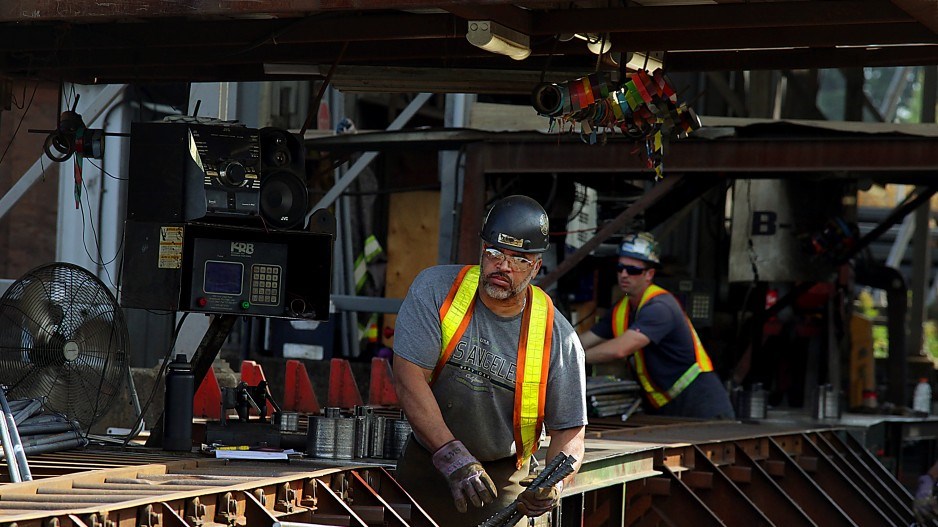With a local workforce of 675, a global head count of 1,100, $370 million in annual revenue and fabrication plants in Surrey, California and Calgary, LMS Reinforcing Steel Group is one of Surrey’s biggest private-sector employers.
It’s also one of the municipality’s best entrepreneurial success stories.
Ron McNeil, CEO and co-founder, and his business partner, Ivan Harmatny, started the company in 1987 with one pickup truck and a crew of 14 ironworkers.
Today, it is one of B.C.’s biggest steel fabrication and installation companies, and it has worked on some of B.C.’s biggest infrastructure projects, including the Golden Ears Bridge, the Sea-to-Sky Highway project, the Vancouver Convention Centre, Ruskin Dam and BC Place.
While the company’s success has a lot to do with hard work and well-timed acquisitions, McNeil said he was also lucky to build his company when and where he did – in Surrey, during a period of significant economic growth.
“Other than the 2008-09 crash, we have had one heck of a strong economy that has given us an opportunity.”
The company started out as a contractor installing rebar on construction projects and later diversified into fabrication.
“We built that into the largest installation company in B.C. and in 1998 bought the assets from the original Lower Mainland Steel,” McNeil said.
As it continued to grow, LMS expanded into Alberta. In 2016, it made another major leap when it acquired two fabrication plants in California.
LMS annually buys 150,000 tonnes of rebar from suppliers in Hong Kong, Singapore, South Korea and Mexico. McNeil said he would buy his steel in Canada, but no Canadian company produces the volume that LMS needs.
Its fabrication plants cut and bend the rebar. LMS also makes post-tension steel cables, which are used to give flexibility to large building and bridges.
“At any given time, we need to buy $60 million worth of steel, so we have financial partners – Alaris [Royalty Corp. (TSX:AD)], Bank of Montreal [TSX:BMO], Mitsui [& Co.] Japanese trading company, who’s been a great partner of LMS and helps support those buys.”
LMS is unusual for a steel fabricator in that it has its own installation division. Of its 1,100 employees in B.C., Alberta and California, most are ironworkers who install rebar at construction projects.
“I think that’s one of the reasons we’re able to gain the market share we have,” McNeil said. “We’re fully integrated. So a customer will call us, and we take care of supply, fabrication, delivery and install in-house. Most of our competitors will sub out the installation.”
He added that the company also has its own trucking division.
McNeil takes special pride in the fact that LMS has a more diverse workforce than some unionized shops.
“We have, I think, the most women in our trade of any of our competitors,” he said. “As far as the ironworker trade, it’s been slow to bring women into the trade. I’d guess we have 50-plus women.”
While LMS has worked on many of B.C.’s largest infrastructure projects over the past 20 years, it won’t be working on the $1.4 billion Pattullo Bridge project.
LMS runs a non-union shop, and the BCNDP’s government’s project labour agreement for the bridge project essentially excludes LMS workers.
“Our price would probably be 20% lower than what they’re going to receive for bids now,” McNeil said. “This NDP position has really forced us not to price our work.”
In other words, the company isn’t even bidding on the project.
McNeil said the impact of that decision has more implications for taxpayers than for LMS, which has plenty of work.
“The cost will escalate. You’re taking out one of the two largest companies in B.C. [which] won’t price the work.”
Being non-unionized appears not to have affected LMS’s worker attraction and retention. The company’s employees belong to an association that provides pensions, which the company matches. It also has its own Red Seal apprenticeship program.
“We’re hiring every day,” McNeil said. “LMS has an academy that can run apprentices right through Red Seal. We brought that in about two years ago and it’s worked out very well for us.”
How much work LMS has in a given jurisdiction is a pretty good indicator of how the regional economy is doing. McNeil said things are picking up in Alberta, and California remains one of the strongest regional economies in the U.S.
“It’s our view that B.C. may slow down, so we are certainly focusing a lot of energy on Alberta and California.”




